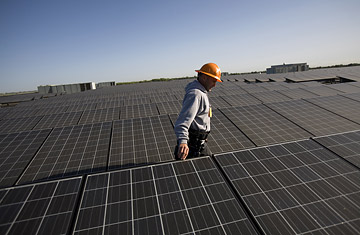
A solar technician checks the rooftop array of solar panels
Most reasonable people agree that the Earth is warming, and that humans are the main cause. But even reasonable people disagree on what we should do about it. At one end are the true believers, like physicist James Hansen, who recently argued that oil executives should be put on trial for crimes against humanity. At the other are the truly doubtful — like Republican Senator Mitch McConnell, who helped block a Live Earth concert from being held on the Capitol's grounds last year — who are convinced that the environmental cost of climate change will prove less disastrous than the expense of curbing it. In between there's plenty of room for rational disagreement.
But here's something all Americans — except maybe Exxon shareholders — should be able to agree on, regardless of where they fall on the green spectrum: more renewable power would be a good thing. Greens support alternative energy, like wind or solar, because it helps de-carbonize our energy supply and reduce pollution. Skeptics support it because with rocketing fossil fuel prices — and the U.S.'s increasing dependence on oil imported from less-than-friendly regimes — renewables can offer homegrown, politically safe price relief. It's a win-win in a world that seems ever more zero-sum.
So, why isn't the government doing more to scale up renewable power? Blame our political system, which Al Gore recently described as "sclerotic at a time when these crises require boldness." Case in point: the federal tax credits for renewable energy, which are set to expire at the end of the year. Passed as part of the 2005 energy bill, the credits encourage businesses to invest in alternative energy. Utilities that produce wind power earn 2 cents for every kilowatt generated over the first 10 years of a project's operation. For solar energy, tax credits can be worth up to 30% of the cost of a project. These credits are modest — especially compared to the billions of dollars in subsidies lavished on the fossil fuel industry — but they've helped renewable power explode over the last several years, with wind energy growing at 45% last year and solar just slightly less.
If the renewable credits do expire (Congress, jammed in a partisan gridlock, refuses to renew them), they'll save taxpayers a little money — maybe $1 billion, or less than half a week of the Iraq war. But the cost to the economy — not to mention the fight against climate change — will be far greater. Navigant Consulting, an international firm that studies the energy industry, estimates that the expiration of the renewable tax credit would result in approximately $19 billion in lost investment, and 119,000 lost job opportunities in the U.S. That's because renewables, while getting cheaper all the time, still cost more than fossil fuels. Subsidies can help bridge the gap as renewable technology improves — but that will happen only if businesses can produce solar or wind power at scale, which will happen only if investors can be assured that the tax credits won't suddenly disappear, says Rhone Resch, president of the Solar Energy Industries Association. (Hear Resch talk about the renewable tax credits on this week's Greencast.)
This year, Congress has repeatedly found itself stalemated over the renewal of renewable credits. Supporters of the credits haven't been able to overcome opposition by Republican senators, the White House and a handful of fiscally conservative Democrats, who won't vote for the credits unless they're paid for as they go. Supporters have tried paying for the credits by rescinding tax breaks for oil companies; they've also tried raising the funds by eliminating tax loopholes that benefit hedge fund managers. Even though oil executives and hedge fund managers are perhaps the most widely hated two groups in America, neither plan has worked.
The potential loss of these credits has already impacted development. Acciona, a large Spanish renewable company that launched a major concentrated solar power plant outside Vegas this year, says similar projects will be impossible in the future without an extension of the tax credit. Abengoa, another Spanish company (European companies have dominated this space, largely because their governments provide significantly more generous subsidies to renewables), is planning to build the world's largest solar plant in Arizona, but the CEO of its solar arm told me recently that the project could fall apart if the credit doesn't come through.
If we're serious about reducing carbon emissions, we'll need a much larger renewable energy sector than the one we have — and that will mean bipartisan government action, in the form of carbon caps and subsidies that dwarf the miniscule tax credits now available. Our government's inability to cooperate and fund an invaluable energy program that costs less than a $1 billion a year is simply unreasonable — no matter what you think about global warming.
